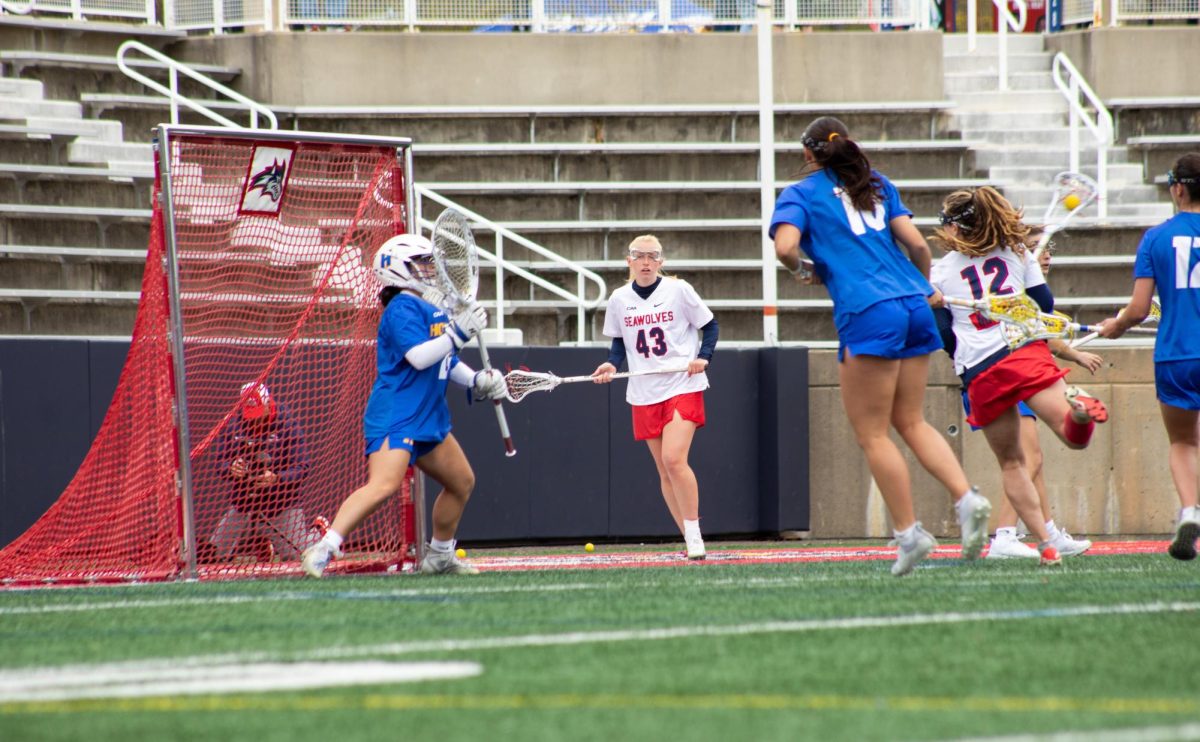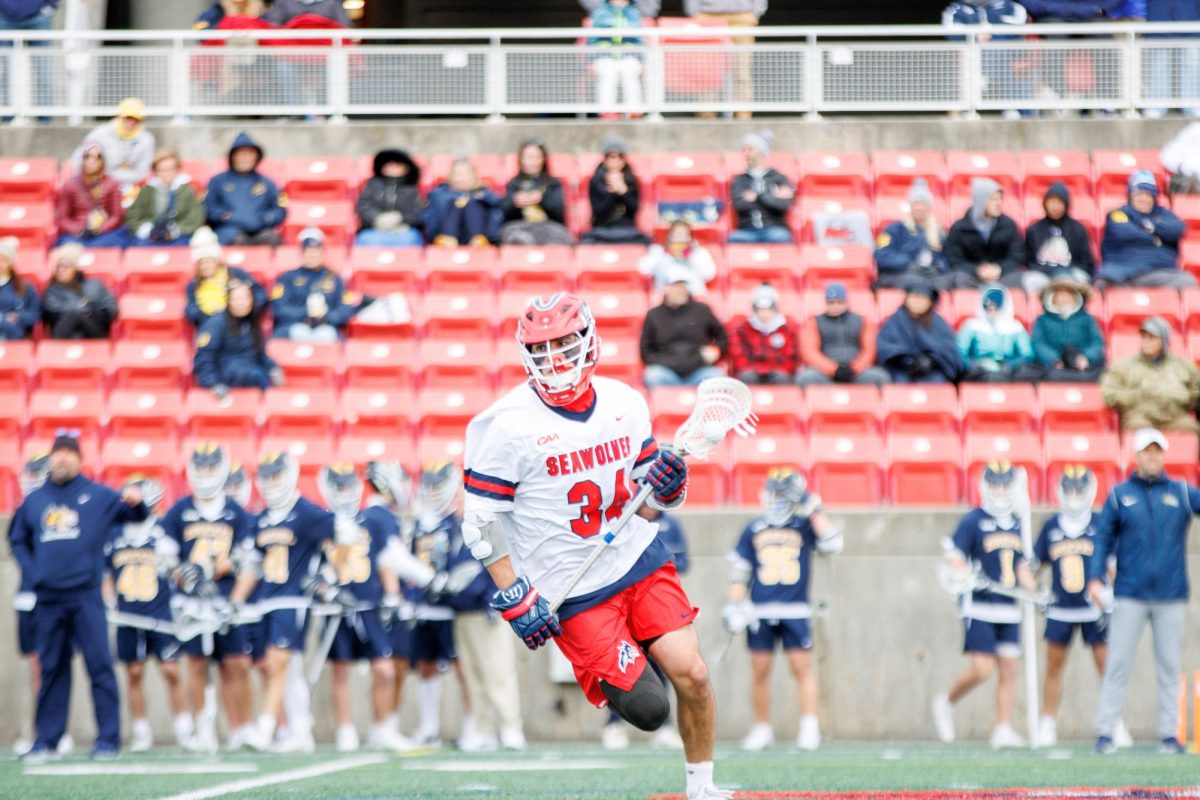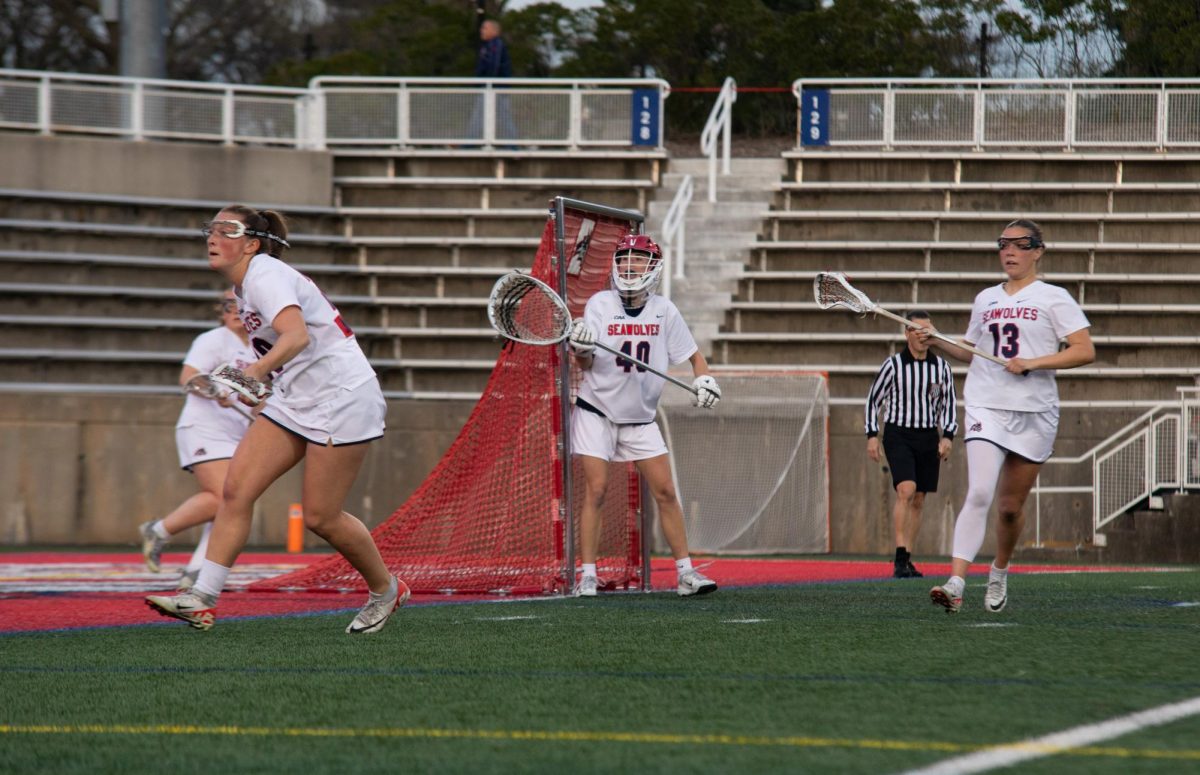For the first time since their College World Series trip in 2012, manager Matt Senk and his Stony Brook baseball team are heading to the NCAA Tournament. The Seawolves were selected on Monday afternoon to go to the Fort Worth Regional on the campus of the nationally-seeded Texas Christian University Horned Frogs.
TCU earned the No. 7 national seed of eight given out on Monday.
Rounding out the bracket is North Carolina State, which earned the second seed in the pool, and Sacred Heart, which the Seawolves beat 8-4 earlier in the regular season.
The NCAA Baseball Tournament is a 64-team tournament that starts with 16 regionals. These regionals are double-elimination tournaments that will occur Friday-Monday, with two games played on Friday, Saturday and Sunday and then a winner-take-all game if necessary on Monday. The winners of these 16 regionals move into Super Regionals, which are best-of-three series the following weekend. After that, the remaining eight teams head to TD Ameritrade Park in Omaha, Nebraska for the 2015 College World Series.
The opener
Stony Brook will open against the NC State Wolfpack on Friday afternoon at 3:30 p.m. at TCU’s Lupton Stadium in a matchup of two teams that enter the 2015 edition of the NCAA Baseball Tournament on a roll. The Wolfpack, under the direction of 18th-year head coach Elliott Avent, have won 13 of its last 16 games, including a trip to the ACC Tournament Final before losing to Florida State.
The Wolfpack’s strength lies in pitching and power. The team sits 32nd in the country in home runs per game (0.89) and 12th in team ERA (2.93).
Led by senior second baseman Logan Ratledge and sophomore first baseman Preston Palmeiro, son of former MLB star Rafael Palmeiro, North Carolina State boasts six players with a batting average above .290.
Ratledge leads the team in home runs with eight, while Palmeiro is right behind him with seven.
On the mound, freshman pitcher Brian Brown leads the way into Friday afternoon’s Regional opener. He enters the tournament with a 7-3 record and holding a 1.72 ERA, good for 21st in the country. He has 70 strikeouts in 73.1 innings pitched and has walked 26 batters. He also allows batters to hit only .211 against him, which will be a very good matchup for the Seawolves, who boast the nation’s 40th-best batting average at .295.
If the Seawolves are going to move into the winner’s bracket of the region, they will need to do consistently what they have done all season, and that is get on base and not commit silly mistakes.
Stony Brook holds the country’s 18th-best on-base percentage (.391) with senior catcher Cole Peragine leading the way at .451, and are top-10 in the country in fielding percentage (.978).
Senk routinely sets up his teams to be pitching and defense-oriented, and not letting his teams beat themselves.
However, this year’s team also has the bats to back up the pitching. Six batters, including Peragine, are batting above .300. There is youth behind this batting as well, as only two, Peragine and second baseman Robert Chavarria, are seniors.
Experience is limited on this roster with only two seniors, as Peragine is the only player to play in an NCAA Tournament game.
North Carolina State, hailing from the Atlantic Coast Conference, also has a trip to Omaha under their belt, making it in 2013.
The rest of the bracket
The other two teams in the bracket, the Horned Frogs and Pioneers, play in the nightcap of that Friday’s first-round doubleheader at 8 p.m.. TCU enters the tournament as the national No. 7 seed, boasting a pitching staff that is second-to-none in the country, sitting second in ERA (2.33) and strikeout-to-walk ratio (3.99). It also helps when the defense aids the pitching, and this team does that.
The Horned Frogs are ranked 11th in fielding percentage, right behind Stony Brook in the national rankings.
This pitching staff is stacked front to back. They have good starting pitching, and the relievers are able to close out the deal when called upon. TCU has a 36-1 record when leading after six innings.
12th-year head coach Jim Schlossnagle has one of the best one-two punches in the country, with redshirt sophomore pitcher Mitchell Traver and junior lefty hurler Alex Young dominating teams left and right.
Traver has a 7-2 record in 12 starts, recording a 1.89 ERA with 60 strikeouts. He only allows teams to bat a miniscule .190 against him, which will be very tough to beat in the postseason.
Young has recorded a 9-2 record in 13 starts, with his ERA just above two at 2.05. He has a little bit more of a workhorse attitude about him, throwing 17 more innings than Traver, but recording 77 innings in the process.
These two starters, along with senior pitcher Preston Morrison and sophomore pitcher Tyler Alexander, all keep teams in check with ERAs under three and neither player allows opposing teams to hit above .250 against them.
To round everything off, the Horned Frogs are an incredible 27-2 at home on the season, where all of the games will be played.
The fourth-seeded Sacred Heart Pioneers are going to have a tough time against either one of these pitchers in their upset-bid Friday night.
Junior infielder Jesus Medina and sophomore infielder Zach Short are the only two players on the Pioneers roster that bat over .300, so the offense does not pose a huge threat to opposing pitchers.
Short is the best at getting on base on the roster, and to win a game in this regional, that will be key to their strength. The Pioneers rank 115th out of the 295 schools playing baseball in the NCAA in stolen bases per game (1.09).
There is no doubt that the Northeast Conference champions will struggle in this bracket due to a lack of offensive production, but it does not help when a strength of each of the other three teams in the Fort Worth Regional are their pitching staffs.
How Stony Brook can make some noise
This is still Stony Brook from the America East in the nation’s eyes. There is a little bit more respect since the Seawolves made the College World Series in 2012, but it is still that small-school team.
But if this team can stay in games, especially late, it can make games interesting. This bullpen is one of the more unknown units and can match up with any lineup in the country. They do not do a bad job of holding leads either, as the Seawolves are 26-1 when leading after six innings.
Against the Wolfpack on Friday night, the offenses match up. It will all depend on how Stony Brook’s starter–whether it be junior Tyler Honahan or sophomore Daniel Zamora–pitches. If either of them pitch as they have all year, then the Seawolves can slip into the winner’s bracket. The Seawolves average more runs (6.3) per game than the Wolfpack do (5.9), and their average is 22 points better than NC State’s.
For NC State to hold off Stony Brook, it will have to avoid walking and giving free passes. The Wolfpack’s strikeout-to-walk ratio is 2.02, which is not a great number but is not bad either. The Seawolves will have to be patient at the plate and try to get runners on base against this good pitching staff. If they win the matchup, they are destined for a test against the top-seeded Horned Frogs.
That is where Stony Brook could run into trouble.
These pitchers do not walk anybody, with each of their four regular starters walking less than 20 batters on the season. The method for Stony Brook would be to attack pitchers early in the count. The Seawolves batters, as good as they have been all season long, will struggle against these TCU pitchers if they get deep into 0-2 and 1-2 counts, because that is when the nasty put-away pitches will come out.
Sacred Heart was not the hardest of wins that Senk and his team have had all season, and if they end up matching up with each other, Stony Brook should have the upper hand as they did on March 25.
Overall, each team in this bracket has a good pitching staff, so it would be safe to say that if Stony Brook can get into a shootout, their chances are better than they would be in a pitcher’s duel. But the Seawolves can go both ways.
They are 13-2 when they score six to nine runs and 10-1 when they score in the double digits. A pitcher’s duel would not be a bad thing for Stony Brook either. The Seawolves are 31-3-1 if they hold their opponents to five runs or less.
None of these teams are offensive juggernauts, so Stony Brook can feel safe in those low-scoring affairs. But the Seawolves would much rather put some runs on the board and get into high-scoring games, where the bullpen can hold onto a victory much easier than in a one-run tight game, where anything can happen.












